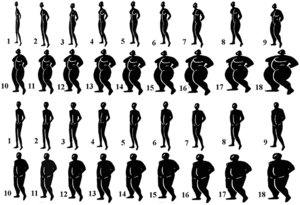Underweight facts for kids
The term underweight means a person weighs much less than what is considered healthy for their height. Being underweight can affect a person's overall health. It's normal for a person's weight to change a little over time.
Doctors often use a tool called the body mass index (BMI) to check if someone is underweight. The BMI is a score based on a person's height and weight. If this score is below 18.5, a person is usually considered underweight. However, this is just a general guide. The BMI score is not used for everyone, especially not for children and teenagers.
Being underweight can happen for many different reasons:
- Not Eating Enough: Sometimes, people don't eat enough food, or they don't eat the right kinds of healthy foods. This can happen if healthy food is hard to find or too expensive.
- Genes and Body Type: Your genetics play a role in your weight. Some people naturally have a "lighter build" or a faster metabolism, which means their bodies burn energy quickly.
- Stress and Feelings: Strong feelings like stress, anxiety, or sadness can sometimes make people lose weight.
- Eating Disorders: Some people have eating disorders, which are serious illnesses that affect how they eat. Examples include anorexia nervosa and bulimia nervosa. These disorders can cause someone to become very underweight.
- Health Conditions: Losing weight suddenly without trying can be a sign of a disease. Some illnesses that might cause weight loss include cancer, tuberculosis, hyperthyroidism (an overactive thyroid), Type 1 diabetes, or inflammatory bowel disease.
- Certain Substances: Sometimes, using certain substances can lead to weight loss.
- Digestion Problems: If parts of your digestive system are not working correctly, your body might not absorb enough nutrients from food.
- Too Much Exercise: People who train very hard in sports might use more energy than they get from their food. This can lead to them becoming underweight.
Contents
Understanding the Challenges of Being Underweight
Being underweight can lead to different challenges. Often, being underweight is not the main problem itself. Instead, it can be a sign that something else is going on with a person's health.
When to See a Doctor
If someone loses weight suddenly without a clear reason, it's important to see a doctor. A doctor can find out if there's another health condition causing the weight loss. If that condition is treated, the weight problem often gets better too.
Health Effects of Low Weight
Being underweight can also affect a person's health in other ways:
- Weakened Immune System: People who are underweight might have a weaker immune system. This means they could get sick more often because their body can't fight off germs as well.
- Nutrient Problems: If someone is underweight because they can't get or afford healthy food, they need special help. Their bodies might not be getting all the important nutrients they need.
- Effects on Girls and Women: Girls and women who are underweight might stop having their menstruation (periods). They might also have problems if they try to have babies later in life.
How Feelings Are Affected
Being underweight can also make people feel sad or worried about their health. It's important for family and friends to offer support and help them feel better.
See also
 In Spanish: Peso bajo para niños
In Spanish: Peso bajo para niños
 | Frances Mary Albrier |
 | Whitney Young |
 | Muhammad Ali |



